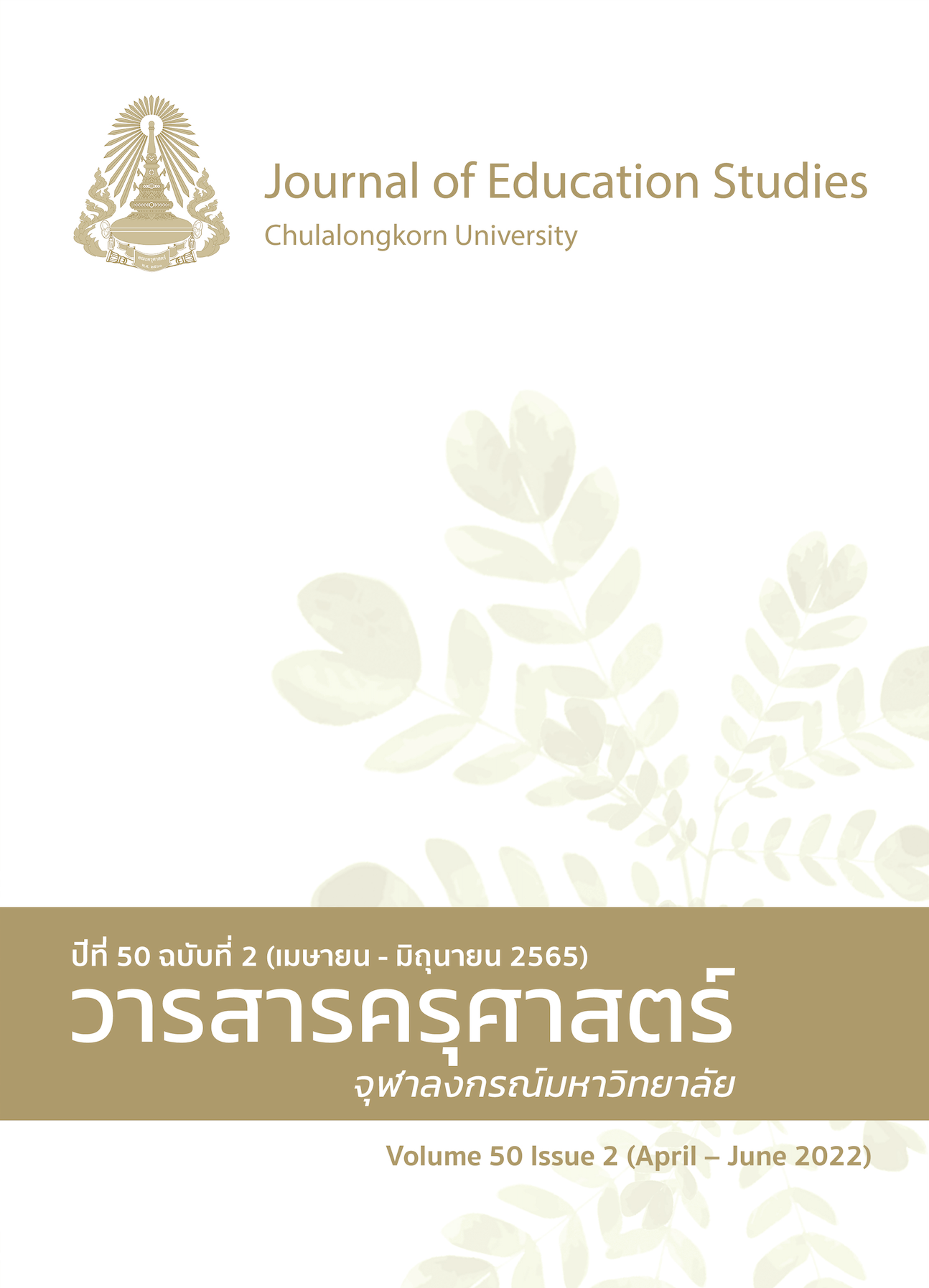Development of a Curriculum Based on 'TPACK' Conceptual Framework and Adult Learning Theory to Enhance Technological Capability of Pre-service Social Studies Teachers in Teaching and Learning Activities
DOI:
https://doi.org/10.14456/educu.2022.19Keywords:
curriculum, pre-service social studies teachers, TPACK, adult learningAbstract
The purposes of this research were 1) to develop a curriculum based on the Technological Pedagogical Content Knowledge (TPACK) framework and adult learning theory and 2) to assess the quality of the curriculum developed. The applied research method was used. The sample was a group of 29 pre-service teachers who were third year students in the Social Studies program at the Faculty of Education in Chanthaburi Province in the second semester of academic year 2021 and was selected by cluster random sampling. The research instruments were 1) a test to measure the ability of using Information and Communication Technology (ICT) integration in teaching and learning activities and 2) a satisfaction questionnaire. The data were analyzed by using arithmetic mean, standard deviation, and t-test. The findings were as follows: 1) the developed curriculum contained principles, aims, teaching and learning guidelines based on the adult learning theory, and the curriculum structure and content based on the TPACK framework; and the result of the curriculum evaluation showed 0.90, and 2) The results of assessing the quality of the curriculum developed revealed that (1) the pre-service teachers’ ability level of using Information and Communication Technology (ICT) integration in teaching and learning activities after the implementation increased at the statistically significant level of 0.05 and (2) the pre-service teachers were extremely satisfied with the training curriculum, the training activities, and the training management, and very satisfied with the output.
References
ภาษาไทย
จันทวรรณ ปิยะวัฒน์. (2558, 4 ตุลาคม). ปัญหาทางเทคโนโลยีการศึกษา. GotoKnow. https://www.gotoknow.org/posts/510530.
ธนาสิทธิ์ เพิ่มเพียร. (2563, 16 กุมภาพันธ์). Adult learning [Video]. Youtube. https://www.youtube.com/watch?v=Y3Xg6JCvtxE.
วาเลน ดุลยากร. (2560). การพัฒนารูปแบบวิดีทัศน์สะท้อนคิดออนไลน์ในกระบวนการพัฒนาบทเรียนร่วมกันตามกรอบแนวคิดทีแพคเพื่อส่งเสริมความสามารถการบูรณาการไอซีทีในการสอน [วิทยานิพนธ์ปริญญาดุษฎีบัณฑิต, จุฬาลงกรณ์มหาวิทยาลัย]. Chulalongkorn University Intellectual Repository (CUIR). http://cuir.car.chula.ac.th/handle/123456789/59580.
ศุภวดี มีเพียง. (2559). การพัฒนารูปแบบการฝึกอบรมตามแนวคิดการเรียนรู้ของผู้ใหญ่และการเรียนรู้โดยการรับใช้สังคม เพื่อเสริมสร้างจิตสำนึกสาธารณะสำหรับทหารกองประจำการกองทัพไทย [วิทยานิพนธ์ปริญญาดุษฎีบัณฑิต, จุฬาลงกรณ์มหาวิทยาลัย]. Chulalongkorn University Intellectual Repository (CUIR). http://cuir.car.chula.ac.th/handle/123456789/52144.
สันถวี นิยมทรัพย์. (2555). การวิจัยและพัฒนาหลักสูตรตามกรอบแนวคิดแบบเน้นกระบวนการเรียนรู้และการบูรณาการความรู้ เทคโนโลยี ศาสตร์การสอนและเนื้อหาเพื่อเสริมสมรรถนะการสร้างบทเรียนดิจิทัลสำหรับครูสังคมศึกษา [วิทยานิพนธ์ปริญญาดุษฎีบัณฑิต, จุฬาลงกรณ์มหาวิทยาลัย]. Chulalongkorn University Intellectual Repository (CUIR). http://cuir.car.chula.ac.th/handle/123456789/42266.
สุนิสา แพรภัทรประสิทธิ์. (2555, 11 ธันวาคม). เครื่องมือการเรียนรู้ของผู้ใหญ่. https://www.gotoknow.org/posts/258875
ภาษาอังกฤษ
Amelan, R. (2020, 6 August). UN secretary-general warns of education catastrophe, pointing to UNESCO estimate of 24 million learners at risk of dropping out. https://en.unesco.org/news/secretary-general-warns-education-catastrophe-pointing-unesco-estimate-24-million-learners-0.
Alsofyani, M. M., Aris, B., & Eynon, R. (2013). A preliminary evaluation of a short online training workshop for TPACK development. International Journal of Teaching and Learning in Higher Education, 25(1), 118-128.
Drexel University School of Education. (2000). How to use technology in the classroom: Benefits & effects. https://drexel.edu/soe/resources/student-teaching/advice/how-to-use-technology-in-the-classroom/.
Erdogan, E., & Serefli, B. (2021). Use of technology in social studies teaching: the journey of five teachers. Journal of Qualitative Research in Education, 27, 232-256.
Frey, B. A., & Alman, S. W. (2003). Applying adult learning theory to the online classroom. New Horizons in Adult Education and Human Resource Development, 17(1), 4-12.
Hicks, D., Lee, J., Berson, M., Bolick, C., & Diem, R. (2014). Guidelines for using technology to prepare social studies teachers. Contemporary Issues in Technology and Teacher Education, 14(4), 433-450.
Hong, J. E., & Stonier, F. (2015). GIS in-service teacher training based on TPACK. Journal of Geography, 114(3), 108-117.
Janssen, L. (2022). How covid-19 exposed challenges for technology in education. https://www.gstic.org/expert-story/how-covid-19-has-exposed-the-challenges-for-technology-in-education/.
Koehler, M., & Mishra, P. (2009). What is technological pedagogical content knowledge (TPACK)?. Contemporary issues in technology and teacher education, 9(1), 60-70.
Kopcha, T. J. (2012). Teachers' perceptions of the barriers to technology integration and practices with technology under situated professional development. Computers & Education, 59(4), 1109-1121.
Levin, T., & Wadmany, R. (2008). Teachers’ views on factors affecting effective integration of information technology in the classroom: Developmental scenery. Journal of Technology and Teacher Education, 16(2), 233-263.
Mason, C., Berson, M., Diem, R., Hicks, D., Lee, J., & Dralle, T.(2000). Guidelines for using technology to prepare social studies teachers. Contemporary issues in technology and teacher education, 1(1), 107-116.
McNeil, H. P., Hughes, C. S., Toohey, S. M., & Dowton, S. B. (2006). An innovative outcomes-based medical education program built on adult learning principles. Medical teacher, 28(6), 527-534.
McQuiggan, C. A. (2007). The role of faculty development in online teaching’s potential to question teaching beliefs and assumptions. Online Journal of Distance Learning Administration, 10(3), 1-13.
Mishra, P., & Koehler, M. J. (2006). Technological pedagogical content knowledge: A framework for teacher knowledge. Teachers college record, 108(6), 1017-1054.
National Council for the Social Studies. (1994). Expectations of excellence: Curriculum standards for social studies. NCSS.
Schleicher, A. (2020, 2 April). Lessons from the covid-19 crisis: education disrupted – education rebuilt. https://www.neweurope.eu/article/lessons-from-the-covid-19-crisis-education-disrupted-education-rebuilt/.
Shriner, M., Clark, D. A., Nail, M., Schlee, B. M., & Libler, R. (2010). Social studies instruction: Changing teacher confidence in classrooms enhanced by technology. The Social Studies, 101(2), 37-45.
Tarman, B., Kilinc, E., & Aydin, H. (2019). Barriers to the effective use of technology integration in social studies education. Contemporary Issues in Technology and Teacher Education, 19(4), 736-753.
Taylor, J. A., & Duran, M. (2006). Teaching social studies with technology: New research on collaborative approaches. The History Teacher, 40(1), 9-25.
Downloads
Published
How to Cite
Issue
Section
License

This work is licensed under a Creative Commons Attribution-NonCommercial-NoDerivatives 4.0 International License.




